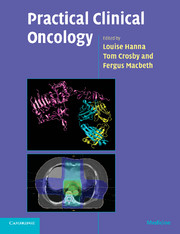Book contents
- Frontmatter
- Contents
- List of contributors
- Preface
- Acknowledgements
- Abbreviations
- 1 Practical issues in cytotoxic chemotherapy usage
- 2 Biological treatments in cancer
- 3 Hormones in cancer
- 4 Radiotherapy planning
- 5 Research in cancer
- 6 Oncological emergencies
- 7 Palliative care
- 8 Head and neck
- 9 Oesophagus
- 10 Stomach
- 11 Liver, gallbladder and biliary tract
- 12 Exocrine pancreas
- 13 Colon and rectum
- 14 Anus
- 15 Gastrointestinal stromal tumours
- 16 Breast
- 17 Kidney
- 18 Bladder
- 19 Prostate
- 20 Testis
- 21 Penis
- 22 Ovary
- 23 Body of the uterus
- 24 Cervix
- 25 Vagina
- 26 Vulva
- 27 Gestational trophoblast tumours
- 28 Lung
- 29 Mesothelioma
- 30 Soft tissue and bone tumours in adults
- 31 The lymphomas and myeloma
- 32 Central nervous system
- 33 Skin cancer other than melanoma
- 34 Melanoma
- 35 Thyroid
- 36 Neuroendocrine tumours
- 37 Cancer in children
- 38 Cancer of unknown primary
- 39 The use of radiotherapy in the treatment of benign conditions
- Multiple choice questions
- Multiple choice answers
- Index
- References
37 - Cancer in children
Published online by Cambridge University Press: 23 December 2009
- Frontmatter
- Contents
- List of contributors
- Preface
- Acknowledgements
- Abbreviations
- 1 Practical issues in cytotoxic chemotherapy usage
- 2 Biological treatments in cancer
- 3 Hormones in cancer
- 4 Radiotherapy planning
- 5 Research in cancer
- 6 Oncological emergencies
- 7 Palliative care
- 8 Head and neck
- 9 Oesophagus
- 10 Stomach
- 11 Liver, gallbladder and biliary tract
- 12 Exocrine pancreas
- 13 Colon and rectum
- 14 Anus
- 15 Gastrointestinal stromal tumours
- 16 Breast
- 17 Kidney
- 18 Bladder
- 19 Prostate
- 20 Testis
- 21 Penis
- 22 Ovary
- 23 Body of the uterus
- 24 Cervix
- 25 Vagina
- 26 Vulva
- 27 Gestational trophoblast tumours
- 28 Lung
- 29 Mesothelioma
- 30 Soft tissue and bone tumours in adults
- 31 The lymphomas and myeloma
- 32 Central nervous system
- 33 Skin cancer other than melanoma
- 34 Melanoma
- 35 Thyroid
- 36 Neuroendocrine tumours
- 37 Cancer in children
- 38 Cancer of unknown primary
- 39 The use of radiotherapy in the treatment of benign conditions
- Multiple choice questions
- Multiple choice answers
- Index
- References
Summary
Introduction
Cancer in children is rarer than in adults. However, many cases are treated successfully, which means that an increasing number of adults are survivors of treatment for cancer in childhood with the long-term morbidity of treatment and an increased risk of further malignancy.
Most childhood cancers differ significantly from cancer in adults in that childhood cancers involve more primitive cell types and a greater reliance on, and response to, chemotherapy for successful treatment. Considerable advances have been made in the management of childhood cancers over the past 30 years. These advances are at least partly due to the early establishment of multidisciplinary teams and collaboration between centres, thus allowing the development of protocols and the entry of many patients into trials or studies whereby treatment schedules could be refined and new ideas introduced.
In the UK, most doctors involved in the diagnosis and treatment of childhood cancers are members of the United Kingdom Children's Cancer Study Group (UKCCSG). The UKCCSG holds meetings twice a year as a group. It registers as many cases of childhood cancer as possible and oversees the management of trials and research. It also provides peer support for single-handed practitioners (most radiotherapists), has a parallel nursing group and provides information and support for parents.
It is difficult to define when children become adults in terms of malignant disease.
- Type
- Chapter
- Information
- Practical Clinical Oncology , pp. 426 - 441Publisher: Cambridge University PressPrint publication year: 2008



